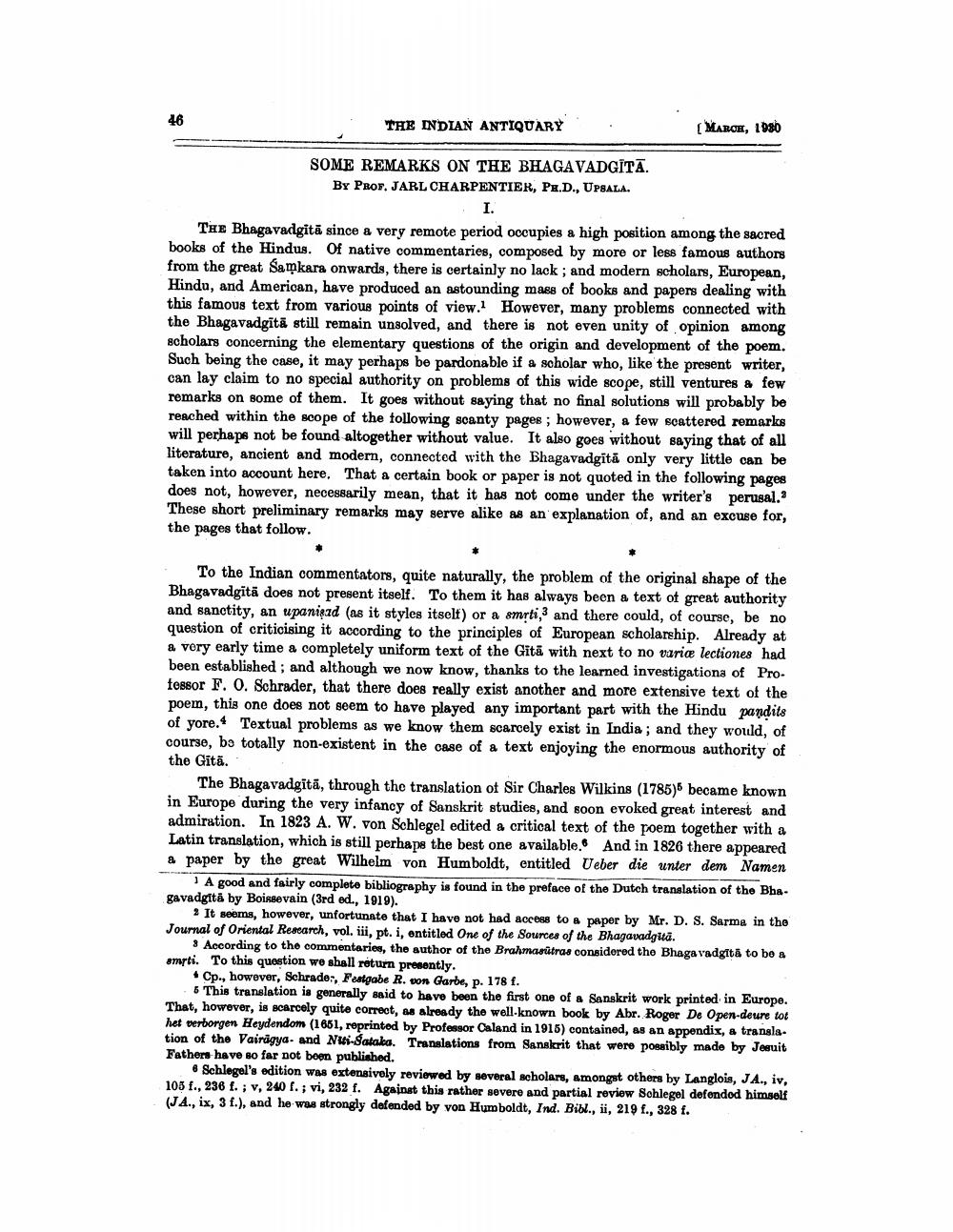________________
46
THE INDIAN ANTIQUARY
SOME REMARKS ON THE BHAGAVADGĪTĀ. BY PROF. JARL CHARPENTIER, PH.D., UPSALA.
I.
THE Bhagavadgita since a very remote period occupies a high position among the sacred books of the Hindus. Of native commentaries, composed by more or less famous authors from the great Samkara onwards, there is certainly no lack; and modern scholars, European, Hindu, and American, have produced an astounding mass of books and papers dealing with this famous text from various points of view. However, many problems connected with the Bhagavadgitä still remain unsolved, and there is not even unity of opinion among scholars concerning the elementary questions of the origin and development of the poem. Such being the case, it may perhaps be pardonable if a scholar who, like the present writer, can lay claim to no special authority on problems of this wide scope, still ventures a few remarks on some of them. It goes without saying that no final solutions will probably be reached within the scope of the following scanty pages; however, a few scattered remarks will perhaps not be found altogether without value. It also goes without saying that of all literature, ancient and modern, connected with the Bhagavadgita only very little can be taken into account here. That a certain book or paper is not quoted in the following pages does not, however, necessarily mean, that it has not come under the writer's perusal." These short preliminary remarks may serve alike as an explanation of, and an excuse for, the pages that follow.
[MARCH, 1980
To the Indian commentators, quite naturally, the problem of the original shape of the Bhagavadgitä does not present itself. To them it has always been a text of great authority and sanctity, an upanisad (as it styles itself) or a smrti,3 and there could, of course, be no question of criticising it according to the principles of European scholarship. Already at a very early time a completely uniform text of the Gita with next to no variae lectiones had been established; and although we now know, thanks to the learned investigations of Professor F. O. Schrader, that there does really exist another and more extensive text of the poem, this one does not seem to have played any important part with the Hindu pandits of yore. Textual problems as we know them scarcely exist in India; and they would, of course, be totally non-existent in the case of a text enjoying the enormous authority of the Gitä.
The Bhagavadgita, through the translation of Sir Charles Wilkins (1785) became known in Europe during the very infancy of Sanskrit studies, and soon evoked great interest and admiration. In 1823 A. W. von Schlegel edited a critical text of the poem together with a Latin translation, which is still perhaps the best one available. And in 1826 there appeared a paper by the great Wilhelm von Humboldt, entitled Ueber die unter dem Namen
A good and fairly complete bibliography is found in the preface of the Dutch translation of the Bhagavadgita by Boissevain (3rd ed., 1919).
2 It seems, however, unfortunate that I have not had access to a paper by Mr. D. S. Sarma in the Journal of Oriental Research, vol. iii, pt. i, entitled One of the Sources of the Bhagavadgitä.
3 According to the commentaries, the author of the Brahmasutras considered the Bhagavadgita to be a smrti. To this question we shall return presently.
Cp., however, Schrade:, Festgabe R. von Garbe, p. 178 f.
5 This translation is generally said to have been the first one of a Sanskrit work printed in Europe. That, however, is scarcely quite correct, as already the well-known book by Abr. Roger De Open-deure tot het verborgen Heydendom (1651, reprinted by Professor Caland in 1915) contained, as an appendix, a transla. tion of the Vairagya- and Nuti-Sataka. Translations from Sanskrit that were possibly made by Jesuit Fathers have so far not been published.
• Schlegel's edition was extensively reviewed by several scholars, amongst others by Langlois, JA., iv, 105 f., 236 f.; v, 240 f.; vi, 232 f. Against this rather severe and partial review Schlegel defended himself (JA., ix, 3 f.), and he was strongly defended by von Humboldt, Ind. Bibl., ii, 219 f., 328 f.




